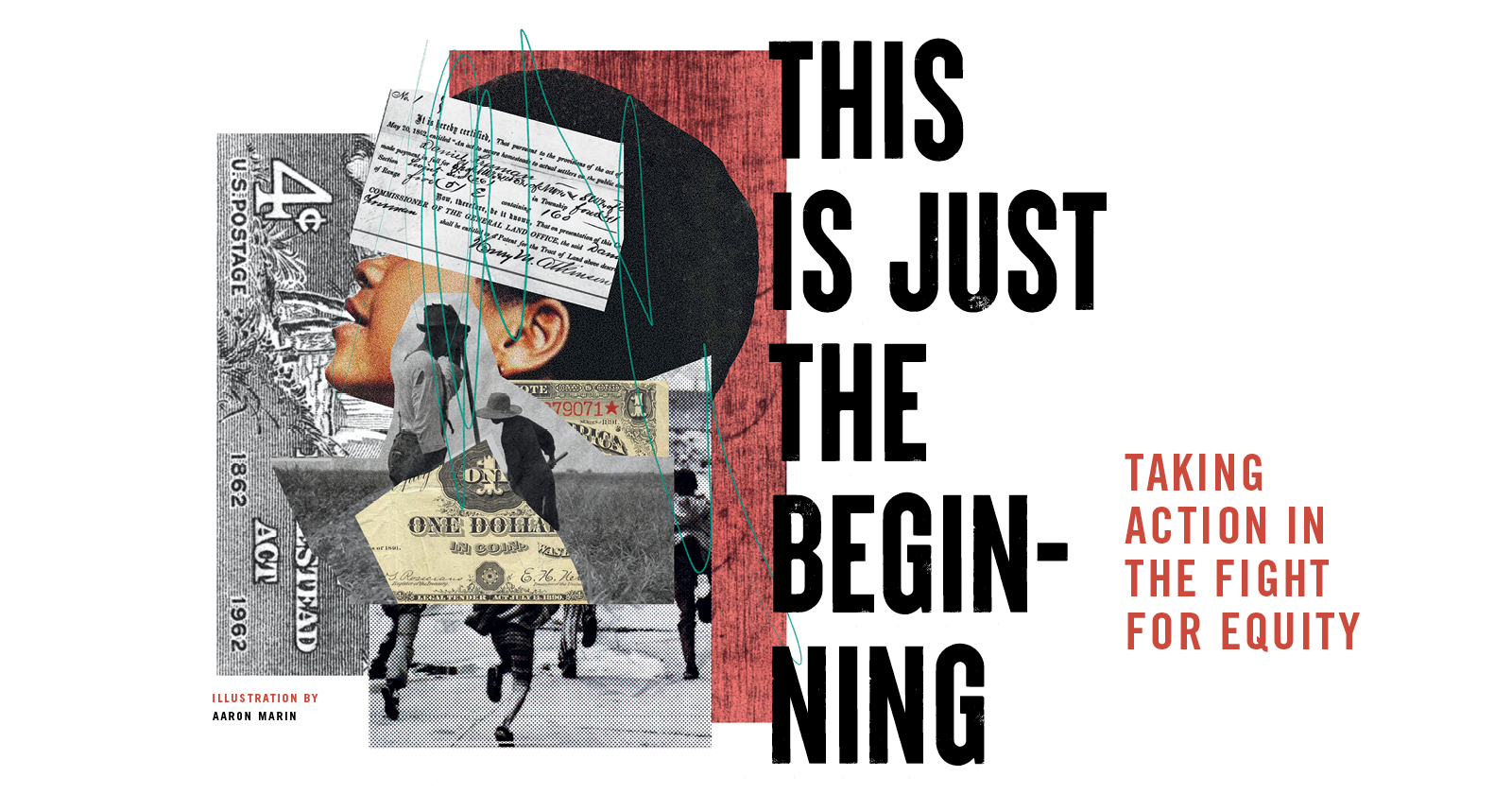Story by Hallie Herz ’07
In August of 2014, I moved to Baltimore for a teaching job. Days after I arrived, Michael Brown was murdered in Ferguson, Missouri, and the movement for Black Lives gained national attention. In the spring of 2015, Freddie Gray was killed by Baltimore police, and the city rose up in anger and grief.
It’s shameful to admit, but that year was the first time I began to feel rage about systemic racism. I’d lived most of my life in northern New England in rural, mostly-white towns where it was easy for me, a white person, to intellectualize racism—to see it as separate from me, to think of it as existing in textbooks, in the past, or in between individuals in bigoted interactions.
After my move to Baltimore, I saw racism everywhere—woven into the fabric of my city. On bike rides across the city, I’d glide through the clean and flat streets of the predominantly white neighborhood I’d moved to. After a mile, I would cross over into a Black neighborhood with public housing projects and bumpy streets, bike up a hill past the jail, and onto smooth pavement in another mostly white neighborhood. I had never lived in a place where racial segregation was so obvious. I soon learned it was by design.
Baltimore, like many other American cities, had been segregated in the early twentieth century through racist zoning laws, restrictive covenants, the GI Bill, and redlining—a practice that allowed banks to refuse housing loans to cities’ Black residents. Now illegal, all of these practices profoundly shaped the Baltimore I live in: where the high-paying jobs are, where the well-funded schools are, and who gets to be safe. During my first year in Baltimore, I began to understand how unequal our country is and how dangerous that inequality is.
The system that violently oppresses my Black neighbors was the same one that had allowed me to see police as protection instead of the threat that they represent to so many Black folks.
This system starved public schools in Black Baltimore neighborhoods, leaving students and teachers in overcrowded classrooms with outdated textbooks and technology. It also gave certain white families the resources to pay for their children to attend the expensive private school where I taught—and it allowed me, and many other wealthy students, to attend Putney, where a year of tuition is more than the average American worker’s yearly income.
The more I learned, the more angry I became. This was so clearly unfair. And it didn’t just exist in Baltimore—why was I just learning about it now?
______
In 2017, I got a phone call from a guy who introduced himself as “Scott, your dad’s financial advisor.” Scott said I was about to inherit over $100,000. Although I knew my family had money, up until this moment, the most money that I’d ever had access to at one time was a few thousand dollars. With this inheritance, I, personally, would be rich—among the richest top 10% of people my age in the U.S.
For many people my age, this money would be a godsend. For one, it would allow them to pay off student debt. Because of my family’s class privilege, I have never had to take out a loan for my schooling—my parents had paid for Putney, college, and graduate school. I was doing fine on my teacher’s salary.
Hearing from Scott threw me off. This sounds naive, but I wanted to live in the same world as my friends—stressing about bills and car payments, saving a little, and living paycheck to paycheck. In reality, I was never in the same boat as most of my friends—I didn’t have student loans, I had the security of my parents’ wealth—and receiving this inheritance bumped up hard against my values and who I saw myself to be, especially because, since moving to Baltimore, I had gotten involved in racial justice organizing. How could I be rich and committed to racial justice when I know about the racial wealth gap? How could I be rich and live with integrity?
A quick history lesson (for more on this, read Nicole Hannah-Jones’ essay, “It’s Time for Reparations”): Today, the average Black family holds about a tenth of the wealth of the average white family—a result of centuries of unequal policies and practices that have disadvantaged Black families while advantaging white families, allowing the latter to pass down land and wealth through generations. Of course, the full story is more complicated—class and race are not the same, and there are many wealthy Black folks and poor white folks. But it’s important to understand the origins of the racial wealth gap we see today.
Throughout our country’s history, Indigenous Americans were pushed off their land and forcibly relocated to make room for settlers. Through the Homestead Act (and others like it), the government gave white settlers “free” land to make their own. The settlers earned money by working the land they had been given. Almost 20% of white Americans, including many Vermonters, can trace their lineage back to these homesteaders.
Other policies, practices, and moments in history follow this pattern. Because of racist redlining maps, 98% of loans insured by the Federal Housing Administration from 1934-1962 went to white people. The GI Bill, a program aimed at helping World War Two veterans accumulate wealth, did just that—but only for white veterans. All of these policies, and more, are what led to the enormous racial wealth gap we see today.
History lesson over. Back to 2017, where I wasn’t ready to address how this legacy allowed my white family to build wealth. So, I procrastinated on signing the paperwork and pretended the money didn’t exist for the next year. It grew, as large amounts of money tend to do, and I ignored it.
I understand if this is the moment where you stop reading. Complaining about how being rich made me uncomfortable—during a global pandemic where people have lost jobs, money, family members—sounds pretty self-absorbed and insensitive. But the reason I’m sharing this is because I know that there are other Putney alumni out there who may be wondering how to align inherited wealth—or other elements of class privilege—with their values. I can only speak from my perspective as a white inheritor of wealth, and your experience might look very different. But, if you have wrestled with similar questions, stay with me, because grappling with them is what led to action.
______
In late 2018, a friend recruited me to attend the annual conference hosted by Resource Generation, an organization that brings together young people with access to wealth or class privilege to redistribute wealth and power. It was the kick in the pants I needed. I realized that I couldn’t hide any longer. Talking about money allowed me to begin to work through the ways wealth has shaped me. I realized that to live my values, I needed to commit to wealth and resource redistribution.
The system that forces people to be poor is the same one that allowed my family to gain wealth. I want to do my part and start redistributing my own money, and I’m still figuring out what this means for me.
Should I keep some of my inheritance for a down payment on a house, knowing that other people don’t have that privilege, or should I try to give it all away? I don’t have answers yet. But, to date, I have redistributed over one-fifth of my inheritance.
One other important thing happened at that conference. I ran into fellow Putney alums Rose Pytte ’14 and Flannery McDonnell ’14. We talked briefly about the potential of bringing together Putney alumni to work together towards wealth redistribution. But when the conference ended, we dropped the Putney ball.
______
In June of this year, I heard from Rose. She and a few other Putney alums had been talking about organizing Putney alumni around wealth redistribution and reparations. I jumped at the chance.
The first few Zoom meetings of our group (pictured) were exciting—and a mess. We didn’t really know what we were organizing towards. We shared what we remembered about our time at Putney (spanning from 2003-2019) and the different types of messages we’d received about class and wealth. We bonded over our shared love of the Putney landscape—our memories of the barn, getting lost in the Putney woods—and how Putney shaped the way we are in the world.
We also shared the feeling that Putney had taught us to care about, and for, our communities and the larger world, but hadn’t effectively prepared us to use our privilege to address the larger systems that contribute to inequality. There were (and are) so many wealthy students at Putney. But, in our time at Putney, nobody had talked to us about wealth or class.
So, as Putney taught us to do, we took responsibility for our own learning. This summer, during the resurgence of the Black Lives Matter Movement and at a time when the Putney alumni community was talking about race and racism, we came together to help each other talk about wealth and class privilege and to begin to move our resources and power towards reparations and redistribution.
We landed on two steps: leading a learning and action group of class-privileged young-ish Putney alumni, and fundraising for an Afro-Indigenous queer and trans Vermont land project. As we said in our letter to Putney alumni from the classes of 2003-2019, “We feel that, as Putney alumni, investing in reparations is a way for us to honor the deep connection we feel with the land and express the heartfelt gratitude we hold for Putney…and to acknowledge and…address the lasting legacies of Indigenous genocide and slavery that have created the unequal distribution of wealth and power that allowed many of us to attend Putney.” The Vermont we know today was shaped by government policies that gave land to white people, denied land to Black people, and took land from Abenaki people; we feel a responsibility to return rightful land stewardship, and the wealth derived from it, to people who for generations have been denied it. So far, we have raised over $140,000 towards this goal.
This group and this work have become a profound space full of joy. Through our efforts, we’ve been able to connect with other alumni and talk about class and reparations.
I’ve found that every person I’ve talked to, no matter their class background, is hungry to talk about these topics.
As a society, we’re bad at talking about money, allowing wealth to remain unequally distributed. Through addressing it head-on, Putney alumni can work to, as Carmelita Hinton wanted, “combat prejudice and injustice wherever it appears.” We’re not sure what’s next, but we do know this is just the beginning.
______
More reading
- “You’re in the richest top 10%,” Resource Generation website
- “It’s Time for Reparations” by Nikole Hannah-Jones, New York Times.



